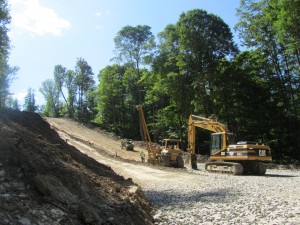NGL pipeline from Pa. stirs controversy in the Bluegrass State

Kim Paynter / WHYY/Newsworks
Bulldozers clear land for a Marcellus Shale gas pipeline in Northeast Pennsylvania.
This week, PublicSource takes a look at a new pipeline project that is “causing quite a stir in the land of Thoroughbreds and bourbon.” Kentucky, that is.
The Bluegrass Pipeline would carry natural gas liquids (or NGLs) from the Marcellus and Utica shales in Pennsylvania, Ohio and West Virginia, pushing them more than 1,100 miles to processing plants in Louisiana.
It’s one of several projects getting off the ground to move the glut of these NGLs to places where they can be broken down into smaller, more valuable compounds – the kind used to make plastic products like bags, tires and detergents. But it’s getting a lot of push-back in Kentucky where some landowners have turned down large sums of money and rejected signing easements out of fears about public safety and property damage.
“What if it killed our cattle and polluted all the streams around here where we couldn’t have animals? How are we supposed to live,” asks Penny Greathouse, one of the voices that can be heard in the PublicSource report.
More from PublicSource:
Some Kentucky landowners told PublicSource they don’t want the pressurized 24-inch diameter underground pipeline coming through their farms because of concerns about public safety, potential destruction of property and environmental harm. Others said they see no public benefit to Kentuckians from a pipeline transporting liquids from the Northeast to make plastics in Louisiana or to export.
The project is a joint venture between two big pipeline companies, Williams Co. and Boardwalk Pipeline Partners. By 2015, the companies want the pipeline up and running, pushing up to 400,000 barrels of natural gas liquids per day.
Natural gas liquids from the shale boom, such as propane, butane and ethylene, are being used to make things like plastic bags and detergents.
The shale revolution has brought increased concerns about pipeline safety. The Bluegrass Pipeline is just one of five proposed pipelines that will move the glut of natural gas liquids from the Marcellus and Utica shale regions in the Northeast.
The Mariner East Pipeline will bring propane and ethane more than 300 miles across Pennsylvania to a refinery in Marcus Hook, Delaware County. Despite a number of high profile incidents, pipeline safety experts say they can be built to drastically minimize or even eliminate risk.
Richard Kuprewicz, who has spent his career working with an inspecting pipelines, says you can tell a good company when it goes above and beyond federal requirements.
“I used to think a billion dollars was a lot of money, but many of these pipeline failures are exceeding many times a billion dollars,” Kuprewicz says. “So in some cases, companies will take the processes to a prudent evaluation and exceed regulations because it’s good practice. Other companies will take the risk and just try to do the minimum regulations and that can be fraught with much danger.”
Scott Carney, a Williams spokesman, tells PublicSource that the Bluegrass Pipeline will be thoroughly monitored 24/7.
“[These are] very in-depth monitoring requirements that we not only follow from the government, but that we set for ourselves,” Carney says.
















